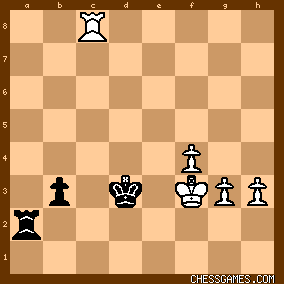Pawn and Two: <wwall> Bogoljubow missed a win. The position after 65....Kd3 is winning for White: 
click for larger viewAfter 66.Rb8 b2 67.f5 Kc2 68.Ke4 or 68.Kf4, White is winning. Here is analysis by Fritz: (3.22) (25 ply) 68.Ke4 Ra4+ 69.Ke5, (6.17) (24 ply) 69...Ra3 70.Rxb2+ Kxb2 71.g4 Rxh3 72.f6 Re3+ 73.Kf4 Re1 74.g5, or (6.57) (24 ply) 69...Ra5+ 70.Ke6 Ra3 71.Rxb2+ Kxb2 72.g4 Re3+ 73.Kf7 Kc3 74.g5. Emanuel Lasker in his book on the match, "Games Played In The Return Match for the World's Championship", noted the missed win by Bogoljubow. However, Lasker's analysis of the position was not entirely correct. Lasker stated, <"It is a pity that Bogoljubow did not win this game because in it he made many excellent moves,....">. Lasker was of the opinion that had Alekhine lost this first game, he would have been warned not to indulge too freely in flights of fancy, such as his 7th move in this game (7...Qb6). While by drawing this lost game, he believed Alekhine was encouraged to go on with the tactics of complication, even though he had to run unsound risks. Lasker concluded the match results justified Alekhine's procedure. Reuben Fine and Fred Reinfeld in their book, "A. Alekhine vs. E. D. Bogoljubow - World's Chess Championship - 1934", also noted the missed win with 66.Rb8. They provided extensive analysis showing the win in many variations. They stated, <"Here Bogoljubow - apparently under the misapprehension that the position had been repeated three times - agreed to a draw."> Fine and Reinfeld stated their variations show White's game to be rather easily won, but admitted the win would not be that easy to discover in time pressure. Bogoljubow in his book on the match, "Schachkampf um die Weltmeisterschaft" provided his explanation, with extensive analysis showing the missed win after 66.Rb8 b2 67.f5. My German is not good, but I think I have his main points. Bogoljubow stated that Alekhine claimed a draw with 65...Kd3, indicating that he believed this move would repeat the position for the third time. Bogoljubow stated that he had doubted this, but in time trouble and with a not entirely correct game score, he left the decision to the match officials (Schiedsrichters). As we now know, Alekhine's claim was incorrect, and the game should have been continued. The game clocks for this game showed that Bogoljubow had used had used 4 hours and 45 minutes, and Alekhine had used 4 hours and 15 minutes. Based on the clock, Bogoljubow would have had approximately 15 minutes to get to move 80. Given his position and the time available, this was not real severe time trouble. Had Bogoljubow been able to successfully dispute the draw claim, I believe he would have would have won this game. | 




